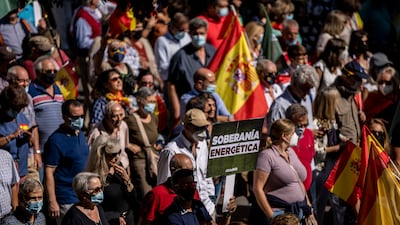The European Commission is developing a “toolbox” of initiatives to help the economic bloc tackle surging energy prices as countries apply national measures to protect consumers from a sharp rise in bills.
Spain, Italy, Greece and France are already planning action, such as subsidies to price caps, in a bid to shield consumers from rising costs at a critical stage of the economic recovery from Covid.
The Commission said it was looking to validate "short-term temporary measures" to tackle the effects of the global energy crisis, while also keeping an eye on long-term climate goals.
European energy commissioner, Kadri Simson, made the comment after a meeting of EU energy ministers in Slovenia concluded that the energy crisis was now "critical".
"In the short run, there are several member states who are ready to introduce short-term temporary measures to protect their vulnerable consumers," Ms Simson said.
The measures include cutting value-added tax and excises on energy, both of which are "in accordance with EU regulations", she said, while other options to help governments respond quickly include direct support to shield consumers from higher costs.
Ms Simson said she had asked EU energy ministers to draw up "a more structured toolbox" of measures within weeks that could include grouped purchase agreements and increased emphasis on cheaper renewable energy.
European power prices rose sharply this year, more than trebling in Spain and elsewhere, fuelled mainly by the rising price of natural gas used for power generation and heating, in addition to low renewable energy output and higher EU carbon prices.
Benchmark European gas prices, for example, have risen by more than 250 per cent since January.
The surge was sparked by economies around the world reopening from Covid-19 lockdowns, with high demand in Asia pushing down supplies to Europe, causing shockwaves in gas-reliant industries, which include everything from power generation to makers of CO2 used in the food trade.
Spain has led the call for the EU to organise a more co-ordinated response to the rising prices, asking the Commission this week to provide options for how EU states could respond.
Spanish government
"We urgently need a European policy menu predesigned to react immediately to dramatic price surges," Spain's economy minister Nadia Calvino and energy and environment minister Teresa Ribera said in a document sent to the Commission.
Spain is introducing its own measures to handle the crisis, including lowering a special tax on electricity for domestic businesses and consumers, with €2.6 billion ($3.05bn) in profit from energy companies redirected to customers and a cap placed on gas price increases.
The country is calling for a centralised European gas-buying platform to be set up.
Italy is to introduce short-term measures to curb the crisis, worth about €3bn, with the country working on a longer-term reform of power bills, its energy transition minister said this month.
Greece announced plans to offer financial assistance to the majority of its households by the end of the year, including a €9 subsidy for the first 300 kilowatt hours consumed a month, higher one-off payments to low-income earners and bigger discounts from the country's main state-owned provider.
Meanwhile, Portugal's environment minister Joao Matos Fernandes said earlier this week that electricity prices for domestic consumers in the regulated market would stay flat in 2022.
In France, the government will issue a one-off €100 payment to the 5.8 million households that receive energy vouchers, while Germany's Economy Ministry said there was no need for government intervention.
This is despite the country not having a utility price cap with its 41.5 million households buying energy in a largely unsupervised retail sector that was liberalised to create choice and dismantle monopolies.
While the European Commission is in talks with member states, there has been no action from Brussels, which has said the price surge should encourage nations to speed up their shift away from fossil fuels.
Austrian climate and energy minister Leonore Gewessler said a faster switch to renewables would make the EU "more resilient to price fluctuations in the long term".
For former EU member Britain, several energy providers have already gone bust with the increase in gas prices set to force more UK energy suppliers out of business.
Britain is considering offering state loans to energy companies that take on customers from providers that go bust, Business Secretary Kwasi Kwarteng said this week.
The country's energy regulator Ofgem raised the cap on the most widely used tariffs by 12-13 per cent from October, after raising it in April due to high wholesale costs.


